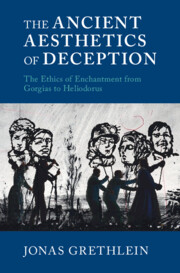Book contents
- The Ancient Aesthetics of Deception
- The Ancient Aesthetics of Deception
- Copyright page
- Contents
- List of Figures
- Acknowledgements
- Chapter 1 Gorgias and the Justice of Tragic Apatē
- Chapter 2 The Circulation and Significance of Apatē in the Classical Era
- Chapter 3 The Dramatic Entanglement of Aesthetic Illusion with Deceit in Sophocles’ Electra
- Chapter 4 Immersion and Corruption in Plato’s Republic
- Chapter 5 The Void of Hellenistic Criticism
- Chapter 6 The Appeal and Challenge of Apatē in Imperial Criticism: Plutarch’s De audiendis poetis
- Chapter 7 Lucian and the Spell of Philosophy
- Chapter 8 How to Read Ekphrasis: The Tabula Cebetis
- Chapter 9 Christian Polemics against Idolatry: Clement of Alexandria’s Protrepticus
- Chapter 10 The Aesthetics of Deception Reconfigured in Heliodorus’ Ethiopica
- Chapter 11 From Deepfake to Psychotherapy: The Aesthetics of Deception Today
- Bibliography
- Index Locorum
- General Index
Chapter 5 - The Void of Hellenistic Criticism
Published online by Cambridge University Press: 23 August 2021
- The Ancient Aesthetics of Deception
- The Ancient Aesthetics of Deception
- Copyright page
- Contents
- List of Figures
- Acknowledgements
- Chapter 1 Gorgias and the Justice of Tragic Apatē
- Chapter 2 The Circulation and Significance of Apatē in the Classical Era
- Chapter 3 The Dramatic Entanglement of Aesthetic Illusion with Deceit in Sophocles’ Electra
- Chapter 4 Immersion and Corruption in Plato’s Republic
- Chapter 5 The Void of Hellenistic Criticism
- Chapter 6 The Appeal and Challenge of Apatē in Imperial Criticism: Plutarch’s De audiendis poetis
- Chapter 7 Lucian and the Spell of Philosophy
- Chapter 8 How to Read Ekphrasis: The Tabula Cebetis
- Chapter 9 Christian Polemics against Idolatry: Clement of Alexandria’s Protrepticus
- Chapter 10 The Aesthetics of Deception Reconfigured in Heliodorus’ Ethiopica
- Chapter 11 From Deepfake to Psychotherapy: The Aesthetics of Deception Today
- Bibliography
- Index Locorum
- General Index
Summary
Hellenistic criticism provides little material for my study; Chapter 5 tries to grasp why this is due not only to its scanty transmission. Neither critics who championed pleasure as the function of poetry nor the ekphrastic tradition seem to have taken an interest in apatē’s ambiguity. We find more evidence at the beginning of the Imperial era in the critical essays of Dionysus of Halicarnassus and in Philo’s polemics against a specific kind of rhetoric and myth. Only Philo, however, exploits apatē’s oscillation between aesthetic illusion and deception. Philo’s debts to Plato help us identify one reason for apatē’s decline in Hellenistic criticism: as some scholia illustrate, Plato’s criticism of poetry was well-known but was often felt to be less compelling than the ideas of other philosophical schools. With due caution, I also suggest that the waning interest in apatē is related to the emergence of the Hellenistic book-culture that made it easy to contemplate aesthetic issues independently of ethical issues.
Keywords
- Type
- Chapter
- Information
- The Ancient Aesthetics of DeceptionThe Ethics of Enchantment from Gorgias to Heliodorus, pp. 107 - 136Publisher: Cambridge University PressPrint publication year: 2021

